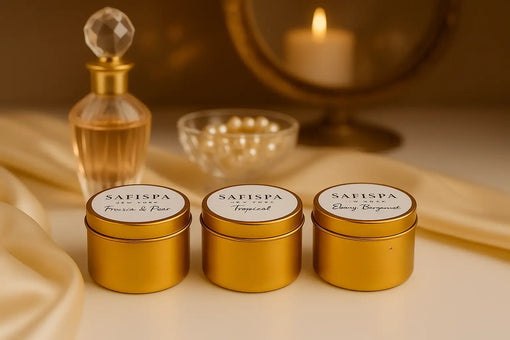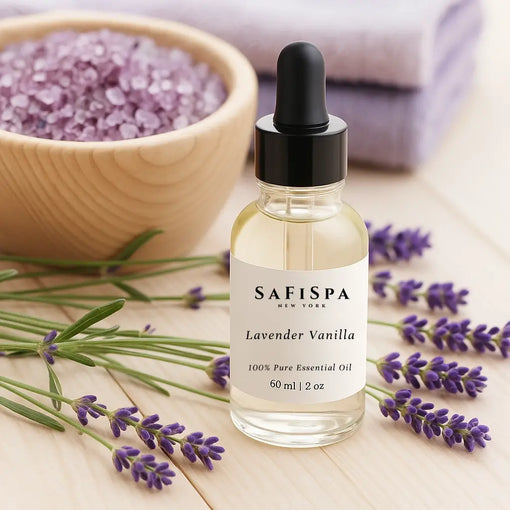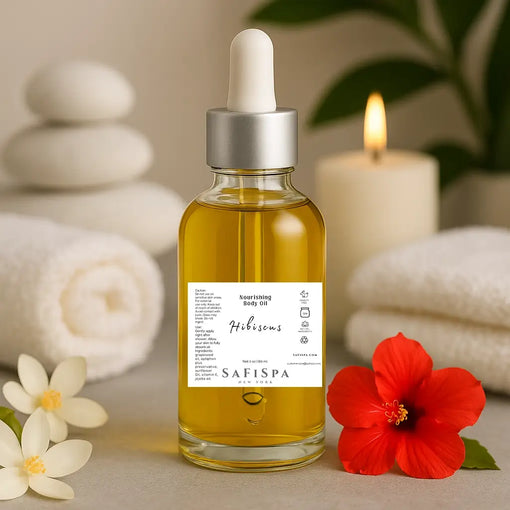25 Science-Backed Daily Habits for Holistic Wellness: A Guide for Mind, Body, and Environment
True wellness is not a destination but a journey built on intentional rituals. Grounded in nutritional science, behavioral psychology, and the sensory power of aromatherapy, this guide distills 25 habits shown by research to support lasting vitality and calm.

The Science of Habit: Why Rituals Outperform Resolutions
Nearly 45 percent of daily actions are habitual, notes research from Duke University’s Psychology Department. Because habits operate automatically, small, consistent behaviors compound into meaningful physiological change. Long-term well-being depends less on intensity and more on repetition and context.
This article follows Google’s E-E-A-T framework—experience, expertise, authoritativeness, and trustworthiness—integrating verified studies from Harvard Health, the National Institutes of Health, JAMA, and the Sleep Foundation. Where possible, we link to primary sources for transparency.
Habits for Restorative Sleep and Morning Energy
1. Prioritize Deep, Consistent Sleep
The Sleep Foundation confirms adults require 7–9 hours of quality sleep for immune repair and cognitive consolidation. Chronic restriction disrupts hormones like leptin and cortisol, raising risks for mood disorders and metabolic disease.
Action: Create a 60-minute wind-down ritual—dim lights, silence devices, and light a low-wick SaFiSpa Lavender Vanilla Candle to cue melatonin with a calming lavender aroma.
2. Anchor Your Morning Ritual
Endocrinology research shows cortisol naturally peaks ~30–45 minutes after waking; a steady routine smooths that spike (see JAMA Network).
Action: Before checking your phone, take three slow breaths by a window. Diffuse energizing peppermint essential oil to signal focus and alertness.
3. Seek Morning Sunlight
A 2020 study in Sleep Health found morning light exposure improves melatonin timing and reduces evening fatigue. Five to fifteen minutes outdoors can realign circadian rhythms.
Habits for Purposeful Movement and Nourishment
4. Move with Purpose—Macro and Micro
Short “exercise snacks” of 1–2 minutes hourly counteract sedentary damage, per the British Journal of Sports Medicine. Even standing or stretching improves insulin sensitivity.
Action: Use aroma as a cue: diffuse peppermint oil pre-workout for energy; post-workout, switch to sandalwood to ground and aid recovery.
5. Eat Mindfully and Slowly
Mindful eating enhances digestion and satiety, reports The American Journal of Clinical Nutrition. Tuning into flavor and texture reduces overeating.
Action: Before your first bite, pause and inhale a drop of bergamot or rosemary oil to activate olfactory awareness and presence.
6. Stay Hydrated
The National Academies of Sciences recommend ~3.7 L for men and 2.7 L for women daily. Even 1% dehydration reduces focus and reaction time.
Action: Keep a water bottle near your workspace and diffuser; let aroma cue hydration breaks.
Habits for Mental and Emotional Balance
7. Practice Gratitude Journaling
In research from UC Davis and UC Berkeley, gratitude practices lowered cortisol and increased optimism (see Greater Good Science Center).
Action: Light a Sandalwood & Vetiver Candle each evening while listing three specifics you appreciated that day.
8. Meditate or Breathe Mindfully
A meta-analysis in JAMA Internal Medicine found mindfulness training reduces anxiety and pain, with brain changes in attention networks.
Action: Apply a drop of frankincense to wrists before meditation to condition a calming anchor.
9. Engage in Social Connection
Harvard’s Study of Adult Development shows quality relationships predict longevity and happiness more than wealth or fame.
Action: Schedule micro-moments of connection—five-minute calls, walks, or shared tea—daily.
10. Limit Screen Time Before Bed
Blue light delays melatonin by up to 90 minutes, finds a study in PNAS. Evening screens increase sleep latency and next-day fatigue.
Action: Power down one hour before bed and transition with candlelight for natural melatonin flow.
11. Express Creativity or Play
Creative acts activate dopamine pathways that reduce stress and improve cognitive flexibility (overview via Positive Psychology).
Action: Diffuse a warm vanilla or freesia oil while painting or journaling to signal relaxation through sensory context.
12. Laugh Often
According to the National Library of Medicine, laughter boosts endorphins and immunity while lowering blood pressure—an effective stress reset.
Action: Curate a five-minute comedy playlist. Pair it with a fresh citrus scent to reinforce a brighter mood.
Habits for a Nourishing Environment
13. Declutter One Surface a Day
Researchers at Princeton University found visual clutter competes for neural resources, reducing focus and productivity.
Action: End each day by clearing your desk or countertop. Light a Sandalwood & Vetiver Candle to mark closure and calm.
14. Bring Nature Indoors
A 2019 Frontiers in Psychology review found indoor greenery lowers blood pressure and cortisol by activating the parasympathetic “rest and digest” response.
Action: Keep low-maintenance greenery—pothos, aloe, herbs—near windows. Mist with a diluted essential-oil spray for freshness.
15. Practice Intentional Aromatherapy
Compounds such as linalool (lavender) and limonene (citrus) influence neurotransmitters (see NIH review).
Action: Use SaFiSpa Essential Oils for targeted outcomes—lavender for sleep, bergamot for uplift, eucalyptus for clear breathing.
16. Light for Mood, Not Just Visibility
Blue-enriched light boosts alertness by day, while warm low-Kelvin light supports melatonin at night (Scientific Reports, 2019).
Action: Evenings: replace overhead glare with candlelight or amber lamps. Try a soft Vanilla Soy Candle.
Habits for Self-Growth and Purpose
17. Read Daily, Even Briefly
Reading strengthens neural connectivity in networks tied to empathy and reasoning (see Scientific American).
Action: Ten minutes under soft light signals calm focus to the brain.
18. Keep a Learning Mindset
Novelty triggers dopamine, aiding memory and motivation (UCSF neuroscience review: Neuron).
Action: Try one new skill monthly—journaling, mindful walking, or healthy cooking.
19. Practice Self-Compassion
Research by Dr. Kristin Neff shows self-compassion reduces stress and perfectionism more effectively than self-criticism (University of Texas).
Action: During mistakes, inhale calming lavender and say, “I’m learning.”
20. Set Healthy Boundaries
The American Psychological Association links boundary-setting to lower burnout and stronger self-esteem.
Action: When logging off work, mark the shift by lighting a SaFiSpa candle—physical rituals reinforce psychological closure.
21. Schedule Digital Detox Windows
Constant notifications raise baseline cortisol. A 2022 Social Media & Society study links heavy screen use to decreased life satisfaction.
Action: Reserve one tech-free hour daily. Replace scrolling with aromatherapy stretching or journaling by candlelight.
22. Help Others
Acts of kindness boost dopamine and oxytocin—the “helper’s high” (see NIH Behavioral Medicine).
Action: Gift a small candle or essential-oil vial to a friend; generosity sustains mood and connection.
23. Spend Time Outdoors
Even 20 minutes outside can lower cortisol by over 20% ( Frontiers in Psychology, 2019).
Action: Pair your walk with mindful breathing and notice scents—pine, rain, earth—training olfactory awareness.
24. Reflect Each Evening
Nightly reflection improves learning retention by ~23% (Harvard Business Review).
Action: Write two lines about what worked—and what to try tomorrow—beside a calming lavender or rose candle.
25. Rest—Truly Rest
Rest is active recovery. Gentle sensory pleasure and daydreaming reset default-mode networks (NeuroImage).
Action: Create a weekly “Sabbath hour.” Diffuse SaFiSpa’s Ebony Bergamot Oil, sip tea, and let your mind wander. Stillness is repair.
Frequently Asked Questions
How long does it take to build a habit?
A University College London study in the European Journal of Social Psychology found that forming a consistent habit takes 18 to 254 days—on average 66 days. Consistency beats intensity.
Can essential oils really affect mood?
Yes. Compounds like linalool (lavender), limonene (citrus), and eugenol (clove) modulate neurotransmitters in limbic pathways (Phytotherapy Research, NIH).
How do candles fit into wellness?
Candles combine warm light and aroma—two cues tied to parasympathetic activation. Studies on light exposure and aromatherapy show combined use can lower anxiety markers and improve subjective calm.
Do I need to follow all 25 habits?
No. Start small. Choose one habit from each category—sleep, movement, mindfulness, environment—and build gradually. Sustainable wellness grows through layering, not overhaul.

























Comments 1
Good advice for daily wellness check! Congratulations and much success 🎊